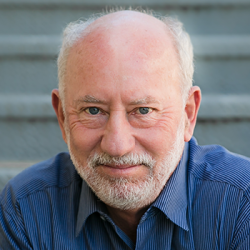
This morning’s keynote at PBL World 2018 began with two students from High Tech High in San Diego. Both will be seniors next year, and not just their work but who they are as people provided powerful testimony for what Project Based Learning can do.
Blake Dujowich began with his story of producing a feature film about the Colorado River, the source of much of the water in the southwest. In the project, students did field work in the Imperial Valley, CA, interviewing fellow students and farmers to learn about water use. Blake emphasized their use of empathy, creativity, connection through exploration, and communication.
Zelma Downs followed, delivering a rap she wrote and a poised, polished talk about the ”growth and realization” she’s gained from PBL and where it will take her. She said to her PBL means honesty, communication, time management, self-organization, confidence, and leadership.
Kaleb Rashad, who gives his title as “creative director (of doing badass work)” at High Tech High, took the stage and explained who he was and where he came from--born in the Jim Crow south, where his dad was beaten up for trying to enter a whites-only restaurant. He told of his days as a 6th grade math/science teacher in a school where it was “not about the kids. It was about test scores and making the principal, district, and board look good. We would machine the kids until we got exactly what we wanted out of them. We’d also machine the joy out of teachers; you’re going to teach this, in this way, on this day, and we’re going to have Interim Assessment Benchmarks every three weeks,” a comment that drew knowing nods and groans.
A Challenge to PBL Teachers
Kaleb noted that “Any system produces what it was designed to produce” – and our schools, for most, have been an oppressive system that taught compliance and how to follow directions. But, he told his audience of current and future PBL teachers and leaders, “What you are attempting to do is bucking the system. My question to you is, where will you find your courage to do so? This is hard work, revolutionary in lots of ways.”
In order to do “real work that matters, we need to take the power and put it back in the hands of teachers.” As Frederick Douglas said, “power concedes nothing without demands,” Kaleb warned us. “Anytime we’re trying to make real change, you’re going to have enemies, and frenemies, as well as friends.”
The chart below shows Kaleb’s comparison of compliance-oriented schools with innovation-oriented 21st century schools. There was a lot to digest in his speech, but to me one of the most thought-provoking—and heart-tugging—ideas to take away was that PBL is not about the project, it’s about human connection and transformation.

As we know from John Dewey, it’s important “to unpack that experience. It’s not enough just do awesome things; we’re not trade schools, not just trying to advance technical skills. I think we have a higher duty, a deeper moral obligation to connect people to themselves. You see that in Zelma – how powerful is it, to be 17 years old, and can speak in your truth, with authenticity, to have sense of who you are, where you come from, what’s important to you?”
“It’s about liberation; we in schools have been oppressed. Like roses in the concrete, (many students) never have an opportunity to grow. Realize that they are worthy of dignity already—every single one of our babies. We have an opportunity. Yes, we can transmit knowledge and skills. But there’s some stuff that computer software can’t do; that’s that human stuff, that empathy work, that compassion work. That’s the work about who you are, where you come from, how to you relate with other people, how do you learn from folks, how do you make an impact on the world?”
Here’s one final quote that struck me, about what’s more important than “the project” in PBL. Kaleb emphasized that’s its really about “Having Socratic conversations, so we understand that you and I come from the same place; I see you, you see me, what do we want to build, bash, or beautify together?”
Amen.
(Kaleb Rashad's full keynote presentation can be found here)

